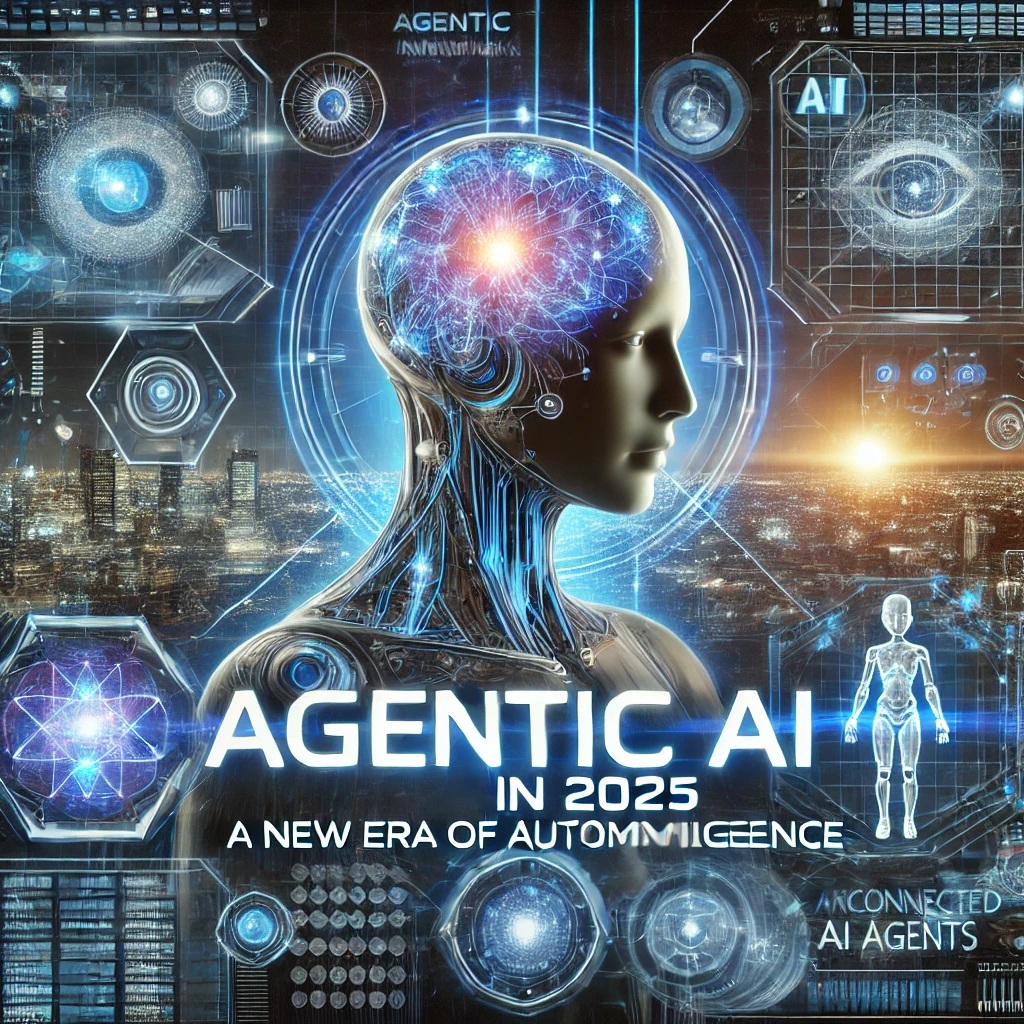Introduction
Artificial Intelligence (AI) has undergone significant transformations over the past decade, evolving from rule-based systems to deep learning models and generative AI. The next frontier in AI development is Agentic AI, an advanced paradigm that empowers AI systems with autonomy, adaptability, and proactive decision-making capabilities. In this article, we explore the key aspects of Agentic AI in 2025, its underlying technologies, applications, ethical challenges, and its anticipated trajectory in 2025 and beyond.

Agentic AI in 2025: A New Era of Autonomous Intelligence
Understanding Agentic AI
Agentic AI refers to AI systems that can operate autonomously, make complex decisions, and dynamically adapt to new information. Unlike traditional AI, which often relies on human inputs for guidance, Agentic AI exhibits characteristics such as:
- Autonomy – The ability to make independent decisions without direct human intervention.
- Proactivity – AI agents anticipate needs and take action instead of merely responding to queries.
- Self-Learning – Continual improvement through reinforcement learning and experience.
- Multi-Agent Collaboration – Interaction with other AI agents or human users in cooperative or competitive settings.
Core Technologies Driving Agentic AI
Several cutting-edge technologies enable the development of Agentic AI systems:
- Reinforcement Learning (RL) & Deep RL – AI agents learn optimal behaviors through trial and error, enhancing autonomous decision-making.
- Neurosymbolic AI – Integrating symbolic reasoning with neural networks to improve cognitive capabilities.
- Multi-Agent Systems – AI agents interact with each other, leading to emergent intelligence and more efficient problem-solving.
- Cognitive Architectures – Inspired by human cognition, these architectures help AI understand, plan, and execute tasks more effectively.
Real-World Applications of Agentic AI
Agentic AI is set to revolutionize various industries, including:
1. Autonomous Decision-Making Systems
Businesses and financial institutions leverage Agentic AI for real-time analytics, risk assessment, and autonomous strategy formulation.
2. AI in Robotics & Automation
Industrial robots equipped with Agentic AI can operate with minimal supervision, optimizing production and supply chain management.
3. Smart Assistants & Personal AI Agents
The next generation of AI assistants will proactively manage schedules, conduct research, and automate complex personal and business tasks.
4. Healthcare & Precision Medicine
Agentic AI is advancing healthcare by assisting in diagnosis, personalized treatment plans, and robotic surgeries.
5. Cybersecurity & AI Security Agents
Autonomous security agents detect cyber threats, analyze attack patterns, and take preventive measures in real time.
Ethical and Safety Considerations
With great power comes great responsibility. Agentic AI presents several ethical and safety challenges:
- AI Autonomy vs. Human Control – Striking a balance between AI independence and human oversight.
- Bias & Fairness – Ensuring AI decisions remain unbiased and ethical.
- Regulation & Governance – Governments and organizations must establish policies to monitor AI development and prevent misuse.
- AI Alignment – Ensuring AI agents’ goals align with human values to avoid unintended consequences.
Challenges & Future Directions
While promising, Agentic AI faces significant challenges that must be addressed for widespread adoption:
- Scalability – Managing complex AI agents at scale remains a technical hurdle.
- Energy Consumption – High computational requirements pose sustainability concerns.
- Integration with Other AI Paradigms – Combining Agentic AI with Generative AI for enhanced creativity and problem-solving.
Conclusion
As we move into 2025, Agentic AI is poised to redefine human-machine interaction, enhancing efficiency and decision-making across industries. However, careful consideration must be given to ethical implications, governance, and technological constraints. The future of AI lies in developing intelligent, autonomous agents that operate in harmony with human values, pushing the boundaries of what’s possible in the digital age.

Millie4135